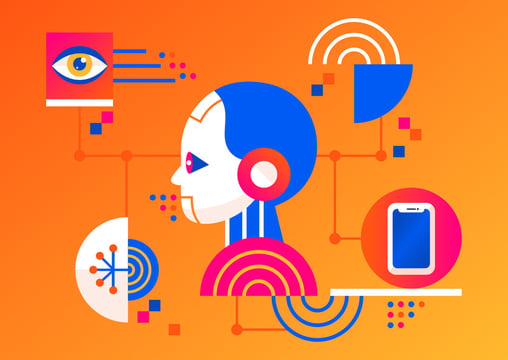Customer experience with artificial intelligence… AI-pocalypse now?
Patrick Egan Ph.D
3/27/23 12:00 AM

New tech = new CX
Generative AI chatbots like ChatGPT have skyrocketed in popularity, offering potentially game-changing applications in business and life. However, consumer concerns pose business risks. Early-adopter companies seeking innovation and efficiency advantages must also navigate potential pitfalls to ensure AI helps - rather than harms - customer experience (CX) and brand perceptions.We used the DISQO CX platform to survey over 28,000 of DISQO’s opted-in audience members. They gave feedback on their understanding, concerns, and limited excitement around generative AI.
Here, we summarize this feedback and share consumer quotes to add color to the data. Download the full report for deeper quantitative insights.
 Apocalyptic scenarios
Apocalyptic scenarios
It’s not hyperbole to say that AI has a bad reputation. Not all AI is made equal, but many average adults have negative associations with “artificial intelligence.” They’re likely unaware of all the places AI is already used. So when they are asked about generative AI, the responses can be apocalyptic.
“Worried that this all ultimately leads to the end of humanity at the hands of militaristic AI.”
Female, 45-54 years old, $25,000-49,999, Oregon
“[It will] become too smart and try to take over the world.”
Female, 45-54 years old, $125,000+, Texas
“AI may develop self-awareness and no longer allow human control of the AI.”
Male, 55-64 years old, $25,000-49,999, Iowa
“I worry about the hacking ability of computers and the potential to take down life as we know it if so much is left to tech and AI.”
Female, 25-34 years old, $50,000-74,999, South Carolina
“[AI will] become sentient beings and kill all of mankind.”
Male, 25-34 years old, $25,000-49,999, Illinois
“My biggest fears [...] hostile foreign governments, terrorist activities and criminals using AI against us and the United States.”
Male, 55-64 years old, $24,999 and under, Kansas
“I'm excited for the day we destroy the monster we've created!”
Female, 35-44 years old, $50,000-74,999, Illinois
Improving knowledge about where AI is already used may help reduce these fears. However, it’s critical that brands take a well-tested and measured tone when communicating about how they are applying AI in their customer engagements.
Detractors’ knee-jerk reactions and even the smallest PR challenge are things no company wants. Corporate communications and legal teams should be fully informed about how generative AI is deployed and should constantly partner with product and technology teams to ensure alignment of practice and messaging.
 Concern: deleterious human impacts
Concern: deleterious human impacts
One of the biggest themes consumers in our audience mentioned was the potential impact of AI on human learning. By outsourcing certain tasks to generative AI tools, they voiced concern over the loss of human ingenuity. Their reasoning: if we let robots think for us, eventually our cognitive skills will diminish, leading to a negative overall impact on human creativity.
“People using it don't learn anything they're supposed to be researching themselves!”
Female, 65+ years old, $75,000-124,999, Minnesota
“Having people become lazy because they don't have to do the research or think much.”
Female, 35-44 years old, $75,000-124,999, New York
“Just like modern music is affected by synthesizers - where all the creative emphasis comes from one musician instead of a group. [This produces] a sterile sound in the music. AI will have the same effect on other creative and intellectual pursuits.”
Male, 65+ years old, $75,000-124,999, Michigan
“I worry about humans losing the ability to complete tasks, focusing too much on computers and losing touch with reality and social networks and the outdoors and exercise.”
Female, 25-34 years old, $50,000-74,999, South Carolina
While these conclusions may hold true in certain circumstances, many generative AI applications disincentivize models involving “thoughtless” humans. In its best forms, generative AI can augment human performance and allow for deeper thinking than would be possible otherwise. It’s a communications opportunity to change default and negative assumptions that AI-supported work will come at the expense of human cognition. Brands should consider and address these biases when communicating their use of AI.
 Concern: AI facilitates bias
Concern: AI facilitates bias
Another theme in our qualitative data revolved around bias. Consumers are highly skeptical of who’s “on the other side” of generative AI applications. In many cases, they presume negative corporate intent, and believe there is no way to know if their models are biased.
“It is controlled by someone I don't know and have no way to judge their intentions.”
Male, 45-54 years old, $75,000-124,999+, Minnesota
“I would be excited if it’s not bought and paid for by corporate media. That is the only way I will trust AI information. Just because it is ‘accurate’ doesn't mean it's without bias.”
Female, 65+ years old, $25,000-49,999, Nevada
“AI gathers information from all sources whether it's true or not. Does not or is not capable of fact checking. Therefore it simply states what's out there. So if the internet is flooded with bad information that's what it relays.”
Male, 55-64 years old, $25,000-49,999, Arizona
When possible, companies should offer transparency into how their generative AI models work. While this might be as simple as referencing the technology suite that your models are running off of, more tech-savvy consumers may expect the ability to double-click on data recency, breadth, or frequency of model updates. Our quantitative survey data suggests that disclosure is a very important issue for everyday consumers.
 Concern: plagiarism and ownership
Concern: plagiarism and ownership
For domains like academia and creativity, plagiarism is a glaring issue that will require extensive oversight and governance. Teachers and professors are already inundated with essays and test answers built by ChatGPT, and content owners are disturbed by the possibility that their hard work can be leveraged by these programs for text-based and image-based outputs. The quotes below highlight their angst, fear, and helplessness.
“As a teacher, it will become increasingly difficult to determine if a student created their own work or copied it from an AI system.”
Female, 45-54 years old, $125,000+, Texas
“AI systems are stealing from other original content creators without their consent.”
Male, 35-44 years old, $24,999 and under, Michigan
“Difficulty determining source and bias. Schools are having difficulty reliably detecting AI - both missing it and falsely accusing - and that type of thing can ruin a life.”
Female, 45-54 years old, $125,000+, California
“I am worried that if people use this technology to cheat their way through college - what will happen to our future lawyers, writers, etc.?”
Female, 18-24 years old, $125,000+, California
Knowledge workers and creatives want to see AI as a tool for good; brands deploying AI need to show them that it can be.
 Optimism: productivity
Optimism: productivity
Our focus thus far on the concerns over potential negative consequences was intentional as the majority of survey respondents erred on the pessimistic side. However, we saw quite a few consumers were extremely excited about a future with generative AI. They pointed out the potential for improving productivity, bridging skill gaps, and empowering low-resource companies with low-cost automation.
“Reducing the time it takes to generate content.”
Male, 65+ years old, $125,000+, Nebraska
“Help people that spend a lot of time creating content [...] when English is a second language.”
Female, 55-64 years old, $75,000-124,999, California
“Aiding with quicker debugging and code creation.”
Male, 35-44 years old, $75,000-124,999, Pennsylvania
“Write things for people who have problems with writing.”
Female, 45-54 years old, $25,000-49,999, Oregon
“Positive impact on small businesses who cannot afford their own marketing and web developers to create website content.”
Female, 55-64 years old, $25,000 - $44,999, Florida
These and other verbatims we received point to a cautious optimism about generative AI. They see the potential, but remain skeptical that brands will be responsible in how they use AI. Companies devoting outsized effort in responsible uses of AI across operations, engineering, communications, marketing, etc. can capitalize on this by differentiating themselves.
 The moveable middle who “don’t know.”
The moveable middle who “don’t know.”
Many consumers simply don’t have a strong opinion yet. This technology is extremely new, incredibly dynamic, and very complex, so as expected many consumers don’t understand it, nor do they have fixed points of view.
“Don't know enough about it - I just recently discovered it.”
Female, 45-54 years old, $25,000-49,999, Georgia
“I don't know enough about Al to have an opinion.”
Female, 25-34 years old, $75,000-124,999, Louisiana
“I need more information on this before I can give an opinion.”
Male, 65+ years old, $75,000-124,999, Michigan
Brands need to understand that their customers mostly remain fairly ignorant on AI. So, they should provide helpful infographics and clear Q&As to educate them while assuaging their possible concerns. Don’t assume the knowledge exists, even with your most tech-savvy audiences. Meet your customers where they are and be willing to discuss the themes isolated in this report via thought leadership pieces, podcasts, interviews, and marketing materials.
There’s more human-generated content from DISQO
This was a mere preview of the larger-scale data-driven insights report:HI and AI: Human Intel on Artificial Intelligence - download it here
All survey data was sourced from DISQO’s 100% opted-in audience between February 28th and March 2nd 2023. Our analyses cover over 28,000 consumers, weighted to a representative US audience on age, gender, and income.
DOWNLOAD NOW!
DISQO’s solutions to help get generative AI right
The DISQO CX platform has solutions for brands looking to test, evaluate, and iterate on their use of generative AI. Whether you’re looking to test messaging, evaluate core attributes, track sentiment, or assess in-channel advertising performance, we have the CX platform for you.Work with us! Reach out to a fellow human.
Say hello@disqo.com

Subscribe now!
Get our new reports, case studies, podcasts, articles and events
